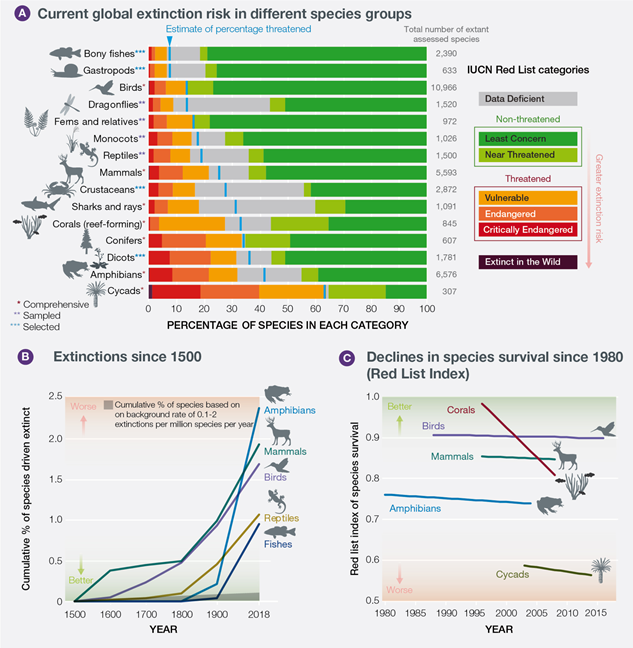What is the IPBES Global Assessment Report?
The Intergovernmental Science-Policy Platform on Biodiversity and Ecosystem Services (IPBES)
is an independent intergovernmental body established in 2012 with now over 130 member states around the world.
Its 2019 Global Assessment Report on Biodiversity and Ecosystem Services examines the state of nature, its ecosystems, and its contributions to people. The Global Assessment aims to empower policy makers with the knowledge and evidence to make better informed decisions when developing policies and taking actions for the benefit of both people and nature.
What does the Global Assessment cover?
The IPBES Global Assessment Report draws on almost 15,000 references and 150 experts in the natural and social sciences from over 50 countries to evaluate how far the world has come - and how much there's left to go - in achieving key international goals ranging from the Sustainable Development Goals (SDG) and Aichi Biodiversity Targets, to the Paris Climate Agreement.
The Global Assessment also outlines the forces that affect biodiversity and ecosystems, forecasts what the future holds if trends continue or change, and explains what this all means for people and policy over the next three decades.
Key Takeaways
|
|
Hear from IPBES Co-chairs Sandra Diaz and Eduardo Brondizio:
Hear from Co-chair Josef Settele, and Sir Bob Watson, Chair of #IPBES7
Key drivers of harmful change in ecosystems:
(in decreasing order of impact)





by tackling the underlying indirect drivers of nature deterioration:
|
1
|
|
|
| 2 |
Reforming sectoral and segmented decision-making to promote integration across sectors and jurisdictions |
|
| 3 |
Taking pre-emptive and precautionary actions in regulatory and management institutions and businesses |
|
| 4 |
Managing for resilient social and ecological systems in the face of uncertainty and complexity |
|
| 5 |
Strengthening environmental laws and policies and their implementation, and the rule of law more generally
|
Subscribe to our newsletter for the latest news on nature and biodiversity - and what they mean for your policies, decisions and actions.
Why should you care?
Nature and the benefits it provides to people and our societies
are fundamental for the existence and richness of human life on Earth.
While more food, energy and materials than ever are now being supplied to people everywhere,
this is increasingly at the expense of nature’s ability to provide such material contributions and services in the future.
Facts from the Global Assessment:
|
Three-quarters of the land-based environment and about 66% of the marine environment have been significantly altered by human actions. On average these trends have been less severe or avoided in areas held or managed by Indigenous Peoples and Local Communities. More than a third of the world’s land surface and nearly 75% of freshwater resources are now devoted to crop or livestock production. The average abundance of native species in most major land-based habitats has fallen by at least 20%, mostly since 1900. More than 40% of amphibian species, almost 33% of reef-forming corals and more than a third of all marine mammals are threatened. The picture is less clear for insect species, but available evidence supports a tentative estimate of 10% being threatened. At least 680 vertebrate species had been driven to extinction since the 16th century and more than 9% of all domesticated breeds of mammals used for food and agriculture had become extinct by 2016, with at least 1,000 more breeds still threatened. Negative trends in nature will continue to 2050 and beyond in all of the policy scenarios explored in the Global Assessment, except those that include transformative change – due to the projected impacts of increasing land-use change, exploitation of organisms and climate change, although with significant differences between regions. |

A substantial proportion of assessed species are threatened with extinction and overall trends are deteriorating, with extinction rates increasing sharply in the past century.
Expert's corner
Paul Leadley, Lead Author, on:
Social economic development scenarios
Kate Brauman, Coordinating Lead Author, on:
Nature's contributions to people
Kai Chan, Coordinating Lead Author, on:
Pathways to sustainability
Almut Arneth, Coordinating Lead Author, on:
Future scenarios for 2050 and beyond
Jens Jetzkowitz, Lead Author, on:
The role of social scientists in the Global Assessment
Claire Tutenuit, General Delegate at Entreprises pour l'Environnement, on: The role businesses play in driving transformational change
Ingrid Visseren-Hamakers, Coordinating Lead Author, on:
Options for decision-makers looking to create transformative change
Progress towards societal goals and objectives
The link between climate change and biodiversity loss
Alfred Oteng Yeboah, IPBES Bureau Member, on:
Informing better policies and actions for governments
Julian Gutt, Lead Author, on:
The importance of oceans
Florence Daguitan, from the Indigenous Peoples' International Centre for Policy Research and Education, on: The role of indigenous knowledge in the IPBES Global Assessment Report
WWF experts on the Global Assessment and its significance:

Rebecca Shaw, WWF International Chief Scientist,
on the IPBES Global Assessment

Pablo Pacheco, WWF Global Forest Lead Scientist, on:
A call to forest conservation under transformative change










